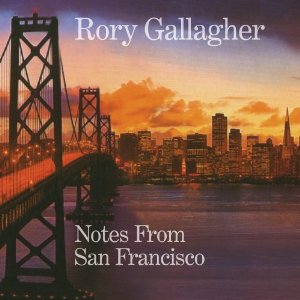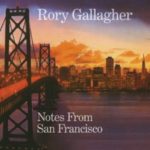
Eagle Records
“What if …” is oftentimes a sad game to play.
No doubt the recent treasure trove of Rory Gallagher music offered by Eagle Records in tandem with the late guitarist’s family will spark many rounds of “What if …” – and in the case of Gallagher, who died in 1995, it is a sad game, indeed.
Rory Gallagher was only 47 when he died; 20 years longer on the face of the earth than Hendrix, Joplin, and Morrison perhaps, but he only received a fraction of the credit and attention he was due. Much of the reason for that is Gallagher himself: as much as he loved performing live, he was basically a shy man and preferred the quiet of his Irish homeland to the sort of international exposure he could have achieved. Hendrix himself was a fan of Rory Gallagher; he was sought out by the Stones; he was asked to step in when Clapton departed Cream … and in the end, all he wanted to do was play his own music with his own band.
One can look at Rory Gallagher’s life as one of missed opportunities – or one can simply accept that much of Gallagher’s career was shaped by his own choices. “What if …” is simply a waste of time; time better spent listening to Rory Gallagher’s music.
Eagle Records’ first round of releases from the Gallagher archives takes us back to the beginning of Gallagher’s solo career. Newly remastered (with some previously-unreleased material) are Gallagher’s first four albums: Rory Gallagher, Deuce, Live In Europe, and Blueprint. Also available in both CD and “DVD form”: http://www.jambands.com/reviews/dvds/2011/04/29/rory-gallagher-irish-tour-74 is Irish Tour ’74 – numbing by virtue of the fact that it is incredible music played well with no gimmicks, glitz, or glitter – just sweat, passion, and talent. Any and all of these re-releases are worth obtaining – even if you’ve owned the earlier versions along the way. The remastering was well done – offering excellent sound quality without washing away the grit that made the originals so damn good.
Along with the re-releases comes an album long spoke of in Gallagher fandom but never heard until now: Notes From San Francisco is the result of sessions Gallagher recorded in California back in late 1977/early 78, but decided to shelve, unhappy with the original mix. He had spoken of revisiting the project with his brother/manager Donal in later years, but sadly didn’t get the opportunity. The San Francisco sessions are now offered (remixed with the family’s guidance), along with a second disc of live material recorded at The Old Waldorf in 1979 – a double shot of San Fran-flavored Gallagher.
We’ll begin our look at this slew of releases with Rory Gallagher, the album that introduced him to the world as a solo artist in 1971 and it comes out of the chute with guns a’blazing: “Laundromat” is the first cut and it remained a fan favorite for the rest of Gallagher’s life – snapping, churning Strat riffs that easily shift into a jazzy glide on the chorus, before diving back into the grittiness. The album proved to be a great sampler of the many sides of Rory – fierce blues rocker (“Hands Up” and “It Takes Time”, one of two bonus cuts); master of the bottleneck (“Sinner Boy” and “Gypsy Woman”, the other extra); jaunty acoustic picker (“Wave Myself Goodbye”, “It’s You”); powerful and imaginative jammer (“I Fall Apart”, “For The Last Time”); hippie folk rocker (the beautifully tumbling acoustic-guitar-and-hand-percussion of “Just The Smile”). Hell, Gallagher even takes a turn on the sax on “Can’t Believe It’s True” – and proves he could’ve just as easily been a jazz cat if he’d decided to be.
Gallagher’s second album, Deuce, was originally released in late 1971 and was recorded in quick bursts of sessions one side or the other of gigs, capturing Gallagher, bassist Gerry McAvoy, and drummer Wilgar Campbell riding the high of a live show. “I’m Not Awake Yet” leads the way with acoustic boldness, followed by the burbling crunch and twang of “Used To Be”. “Don’t Know Where I’m Going” is Gallagher as a guitar-and-mouth-harp hobo, a part he plays just as naturally as bottleneck-wielding guitarslinger (“Whole Lot Of People” and the epic “Crest Of A Wave”) or bluesy jazzbo (Should’ve Learnt My Lesson”, “There’s A Light”). And “In Your Town” proves beyond the shadow of a doubt that you don’t need more than one chord to get the job done if you want to do it badly enough.
Live In Europe captured the trio on stage in February and March of 1972. There are many moments of brilliance: a blistering run through the classic “Messin’ With The Kid”; the slow grind of the previously-unreleased “What In The World”; and Gallagher’s searing slide work on “Hoodoo Man”, another bonus cut. The album’s centerpiece however, is “Going To My Hometown” with Rory lovingly beating the living dogsnot out of his little mandolin while Campbell and McAvoy provide just enough of a pulse for Gallagher to bounce off of. He flails, chunks, and chops, turning the mando into a fierce rhythm machine, sometimes scatting along to the little riffs he comes up with while gathering the audience up in the exuberance of his performance. Listen to the recording: Rory Gallagher owns that crowd … and he did it with passion, sweat, and a shy smile.
1973’s Blueprint found Gallagher moving from the power trio format to the lineup that may have been one of the best he ever played with: the ever-faithful McAvoy on bass, drummer Rod De’Ath, and keyboardist Lou Martin. Right off the bat, “Walk On Hot Coals” is the perfect showcase for what the foursome was capable of, with Martin complimenting Gallagher’s sound without ever overplaying, whether it’s in the body of the song itself or in the throes of a jam. Gallagher’s acoustic side is yet again well-represented on Blueprint, including a ragtimey “Unmilitary Two-Step” and a luscious dollop of bluesy 12-string and harp on “Banker’s Blues” (supported by Martin’s beer parlor piano). There are moments of fierceness and swagger (the bottleneck-powered bonus cut “Stompin’ Ground”; the jammed-out “Seventh Son Of A Seventh Son”) and sweetness (dig Gallagher’s mournful lap steel on “If I Had A Reason”).
This same foursome takes the stage on Irish Tour ’74. If you’ve never experienced Rory Gallagher’s music before, this would be an excellent place to start, if for nothing more than the opening cut, “Cradle Rock”. The first few seconds are deceiving: a simple introduction, followed by a moment of off-to-the-side tuning peg twisting. When things ignite, though, they take off, big-time: “Cradle Rock” is nothing shy of seven-minutes-and-thirty-seven-seconds’-worth of joyous, blues-soaked, rocking rumble, propelled by McAvoy and De’Ath’s rolling-and-tumbling rhythm, Martin’s chugging organ, and hoodoo-voodoo guitar work by Gallagher. “Walk On Hot Coals” takes off to some place that is in turn pensive, greasy, and jazzy; the whole damn house gets involved in belting out “Too Much Alcohol”; and, just in case you’d forgotten that Gallagher was a bluesman at heart, put an ear to “As The Crow Flies”: nothing but acoustic guitar, an occasional slide, a touch of blues harp, and a whole lotta soul.
The previously-unreleased tunes on Notes From San Francisco are an interesting mix of experimentation and pure Rory. There’s never a question of whose album it is, but there are moments when you can hear the influences Gallagher was trying on. “Rue The Day” could almost be the late Phil Lynott and Thin Lizzy recording in the basement of Keith Richards’ old Nellcote lair, complete with Exile horns. (Amend that to horn, singular: Martin Fiero’s sax can be found on two of the cuts on Notes, “Rue The Day” and “Brute Force & Ignorance”. On the latter, the late Fiero punches out a bed of staccato tones for Gallagher to solo over. It’s not until the final 30 seconds or so of the song that Fiero himself lets loose with some sweet, thick lines of his own – not nearly enough, but it’s a never-before-heard taste, nonetheless.) The brontosaurus stomp of “Mississippi Sheiks” could be a distant cousin to Blue Oyster Cult’s “Godzilla”; “Cut A Dash” borders on Jeff Beck-ish funky fusion. “Persuasion”’s big, multi-layered guitar sound again recalls vintage Thin Lizzy, especially when its major-chorded chorus erupts from the minor-themed verses. But nothing sounds forced or faked – and there’s plenty of just-plain-Rory grit on tunes such as “B Girl”, “Cruise On Out”, and “Out On The Tiles”. Donal Gallagher’s son Daniel produced the album with Martin Dubka handling the remix that Rory had wished for. Would the results have pleased the late genius? The only benchmark one can use is the fact that tucked in amongst the string of previously-released albums, Notes From San Francisco fits in as a logical step in the evolution of Rory Gallagher’s music. The fact that the project was done with love and respect shines through.
The second half of Notes From San Francisco is a live disc that finds Gallagher returning to the trio format with McAvoy still alongside of him on bass and Ted McKenna taking over the drum slot. It’s easy to forget that there’s only three of them on stage: Gallagher simply burns on the openers “Follow Me” and “Shinkicker”, never slacking off for the set’s dozen cuts. “Off The Handle” features some totally wild-ass harmonics, squeals, bends and dive-bombs – a primer in Gallagher’s mastery of his instrument. “Country Mile” is a high-wire romp, done at a “Rip This Joint”-style pace that seems destined for disaster but never misses a clip. “Bullfrog Blues” is simply joyous fun, while a cover of “Sea Cruise” brings the house down with its blazing slide guitar and driving beat.
Ah, Rory. What if … but no – there’s no point in that.
The best one can do these days is burrow into the man’s music and appreciate his talent, spirit, and heart. These releases from Eagle Records are a wonderful way to do just that.



No Comments comments associated with this post